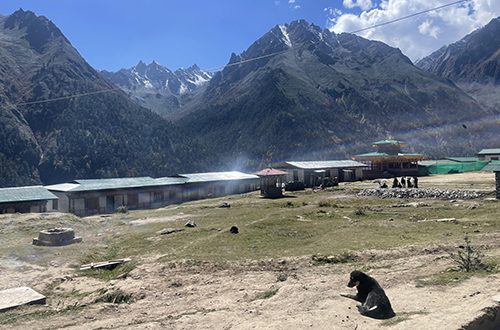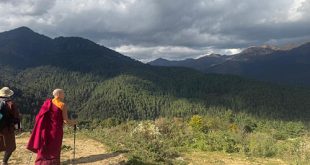Children in Laya dream of going to school, but only up to Class 10. Beyond that, the dream begins to fade.
For many students in Laya, continuing education beyond the basic level is a challenge that feels almost impossible to overcome.
Despite their determination, factors such as the absence of higher classes in the community, long travel distances to secondary schools, family responsibilities, financial hardship, and early marriages make further education a distant goal.
“I want to study, but after Class 10, there’s no higher school near here,” said Tshering Om. “I want to continue, but I’m the eldest and there’s no one to help my parents when I’m away.”
Laya is one of the most remote gewogs in Bhutan, sitting more than 3,820 meters above sea level. The area’s isolation has long made access to education and services a challenge.
The local school, Laya Middle Secondary School, offers classes only up to Class 10, meaning students who wish to pursue higher secondary education must travel to Gasa or even Punakha, often days away by foot and pony.
This physical distance discourages many. Parents worry about the safety of their children, especially girls, who would have to live away from home. “We cannot send our daughters so far. We also worry about them being alone,” said Rinzin Dem, a mother of a 12-year-old girl.
So, after Class 10, most of them stay back and help at home.
In Laya, where yak herding and cordyceps collection are the main livelihoods, every family member plays a role in sustaining the household. Students often have to balance school with helping their parents in the fields or tending yaks in high-altitude pastures.
For some parents in Laya, the dream for their children’s education goes far beyond the mountains that surround them.
Rinchen Lham, 41, a mother of three, said her biggest wish is for her children to study as long as they can, even if it means they have to leave Laya. “I didn’t get to study, but I want my children to learn and see the world beyond these mountains,” she said. “I don’t want them to suffer like us. If they can go to school, they might have an easier life.”
However, she added that some parents in Laya, when children reach Class 10 face a difficult decision , whether to send them away or keep them home to help.
She said that it’s not that parents don’t value education, but every helping hand is needed at home.
Another parent, 29-year-old Karma Karma, said that most parents in Laya cannot afford the schooling expenses. “If the government supports them with scholarships, it’s easier,” he said. “But even if they don’t get it, I will work hard and pay for my children’s education. I want them to study and make their own future,” he added.
For many like Karma, the value of education outweighs the hardship. “Our children must not stay like us, tending yaks and collecting cordyceps forever,” he said, adding, “They should study and find new opportunities.”
Pema Wangmo, a mother of two, shared a similar view. “Education is the only way our children can change their lives,” she said. “But we worry when they go far away. If there was a higher secondary school here in Laya, every child would continue.”
Parents in Laya continue to hope that someday their children won’t have to walk for days or cross mountain passes just to study beyond Class 10. For now, that hope remains as distant as the schools themselves.
Yet, despite these challenges, the determination of Laya’s parents stands strong. They may live in one of Bhutan’s most remote corners, but their dreams for their children reach far beyond the mountains.
 The Bhutanese Leading the way.
The Bhutanese Leading the way.



